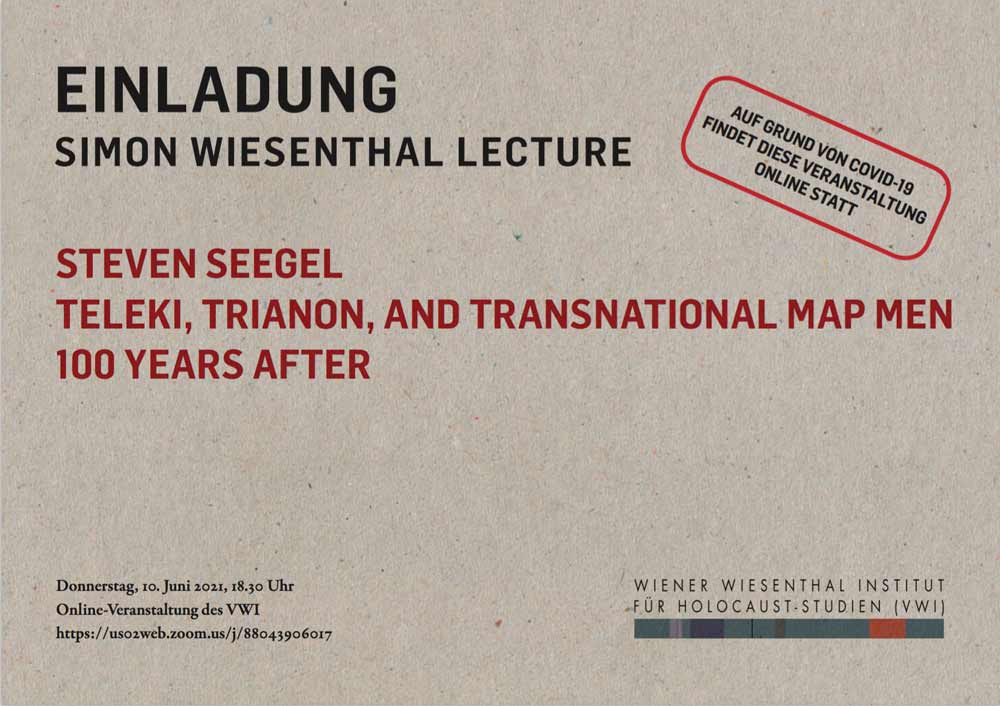Simon Wiesenthal Lectures
Die regelmäßig, alle sechs bis acht Wochen stattfindende Vortragsreihe, setzt sich zum Ziel, mithilfe renommierter Wissenschaftlerinnen und Wissenschaftler die aktuellsten Forschungsergebnisse zum Holocaust sowohl einem Fach- als auch einem breiteren Publikum zu präsentieren – und dabei das beeindruckende Spektrum dieser Disziplin, die zahlreichen Frage- und Problemstellungen von der empirisch-analytischen Historiografie bis zu kulturwissenschaftlichen Themen, jüngere Forscherinnen und Forscher ebenso wie bereits arrivierte, zu berücksichtigen.
Die Vortragsreihe der Simon Wiesenthal Lectures hat sich seit 2007, noch in der Aufbauphase des Wiener Wiesenthal Instituts für Holocaust-Studien (VWI), damals in Zusammenarbeit mit dem Dokumentationsarchiv des österreichischen Widerstandes und dem Institut für Zeitgeschichte der Universität Wien, als tragendes Element der Vermittlung neuerer wissenschaftlicher Ergebnisse im Bereich der Holocaustforschung bzw. der Holocaust- und Genozid-Studien zum Flaggschiff der Vermittlungstätigkeit des VWI entwickelt.
Über ein Jahrzehnt bot das Österreichischen Staatsarchiv im Dachfoyer des Haus-, Hof- und Staatsarchivs großzügigerweise den Simon Wiesenthal Lectures Obhut. Während den herausfordernden Jahren der Pandemie wurden die Lectures online abgehalten. Ab Herbst 2022, um weitere Publikumsgruppen zu erschließen, konnte mit dem Wien Museum eine neue Kooperationspartner gewonnen werden. Bis zur Wiedereröffnung des Hauptstandortes am Karlsplatz werden die SWL im MUSA, Felderstraße 6-8, neben dem Wiener Rathaus stattfinden.
| Simon Wiesenthal Lecture | |||
| Steven Seegel: Teleki, Trianon, and Transnational Map Men 100 Years After | |||
Donnerstag, 10. Juni 2021, 18:30 - 20:00 The lecture will be online: https://us02web.zoom.us/j/88043906017
|
|||
The lecture focuses on the life and death of Count Pál Teleki (1879-1941), twice prime minister of Hungary, in relation to the Treaty of Trianon (1920) and its legacy after a century. Teleki developed his reputation as a professional geographer, among Europe’s prominent “map men” of his generation. Through scholarship in critical geography and cartography, I examine his gendered fantasies of North American frontier space; the origin and significance of his antisemitism and anticommunism; his subtextual grasp of post-World War I symbology and territorial revisionism; the cultural significance of the famous Carte Rouge map; his efforts at Transatlantic diplomacy; his family’s contacts with Transatlantic geographers and his eventual suicide in April 1941; and the long legacy of illiberal politics in Hungary and Europe since the Treaty of Trianon. Steven Seegel is Professor of Russian, Central and East European, and Eurasian History at the University of Northern Colorado. He is the author of Map Men: Transnational Lives and Deaths of Geographers in the Making of East Central Europe (University of Chicago Press, 2018), Ukraine under Western Eyes (Harvard University Press, 2013), and Mapping Europe’s Borderlands: Russian Cartography in the Age of Empire (University of Chicago Press, 2012). He has been a contributor to the fourth and fifth volumes of Chicago’s international History of Cartography series, and has translated over 300 entries from Russian and Polish for the US Holocaust Memorial Museum’s Encyclopedia of Camps and Ghettos, 1933-1945, in multiple volumes, published jointly by USHMM and Indiana University Press. Professor Seegel is a former director at Harvard University of the Ukrainian Research Institute’s summer exchange program. https://us02web.zoom.us/j/88043906017 By attending this event, you consent to the publication of photographs, video and audio recordings made during the event. |
|||







